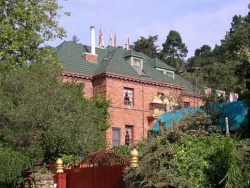Nyingma Roots in the Golden State
One of the oldest, if not the oldest, Tibetan Buddhist centers in California is the Tibetan Nyingma Meditation Center (Tibetan Nyingma Institute), founded in Berkeley in the 1970's.
The Nyingma Institute's home grounds span, among other spaces, two former Greek Chapter houses, one Neo-Georgian (originally a Delta house), constructed in 1927 and the other a Classical Revival building (originally a Psi Upsilon House), built in 1912. The Nyingma Institute first occupied the structures in 1971 and 1973, respectively. Like several other center's I've posted on, the center's history incorporates a story of occupying heritage rich structures and contributing further to them.
With such histories, there is usually a force linked to an individual that can be found. In this story, it is Lama Tarthang Tulku. Tulku, who immigrated to the States in the first wave of Tibetan exiles in the 60's, is the founder of the Nyingma Institute as well as Odiyan Monastery, further up the coast and a sister organization to the Nyingma Buddhist Institute, both centers in the global network of Nyingma. Dharma Publishing, one of the foremost global publishers of Tibetan Buddhist texts, was also founded by Tulku and is one of the many projects under his tutelage.
The Nyingma Institute itself offers several fields of study, including (to name only a few of the many lines of study) Nyingma psychology, meditation, Tibetan language and art. Volunteer opportunities are an integral part of the center's organization and continuing education courses are also offered, for example, for lawyers, therapists and social workers.
The Nyingma Institute is a truly historic example of a dharma center that integrates vigorous study, rooted in both religious, spiritual and community oriented practical perspectives as well as draws together practitioners for traditional Vajrayana practices and study.
Posted by Annika Lundkvist at 9:37 AM
